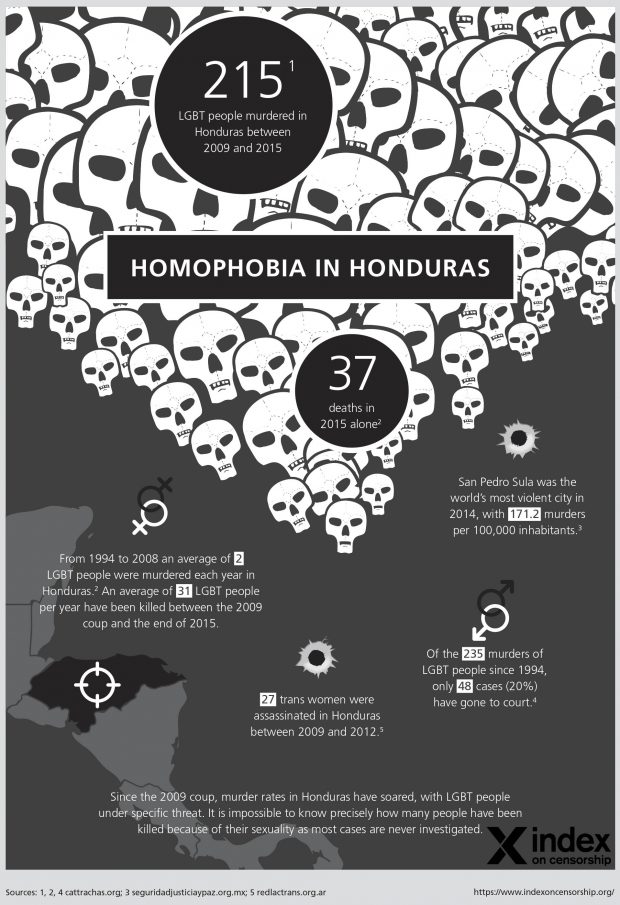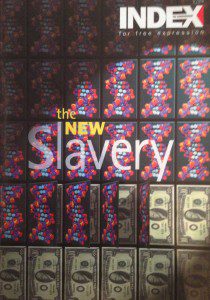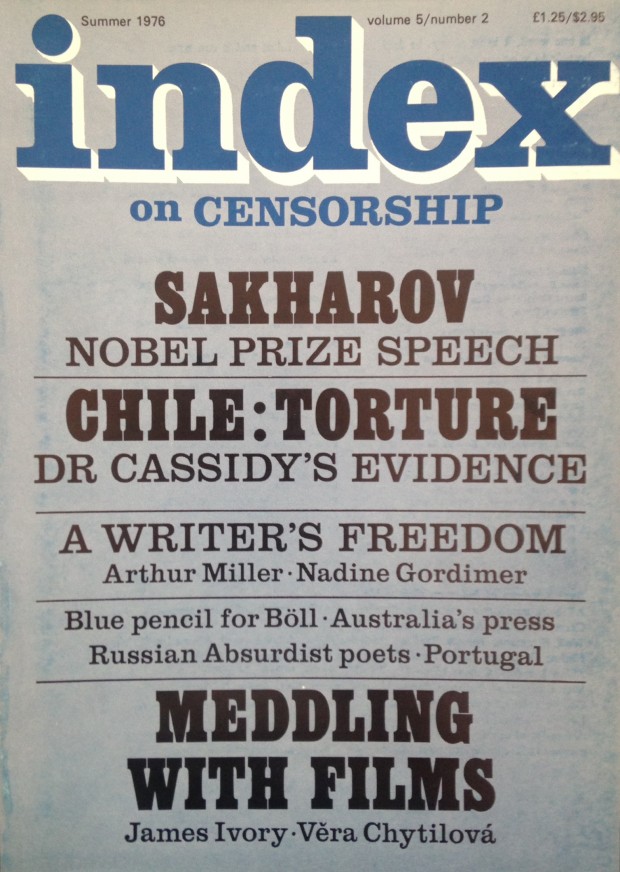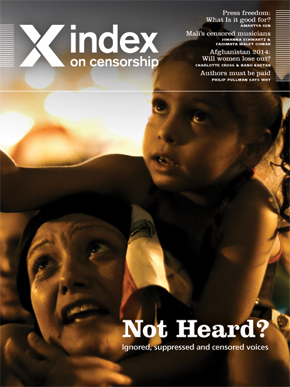20 Apr 2016 | Americas, Honduras, Magazine, mobile, Volume 45.01 Spring 2016
[This article is also available in Spanish]
A year after returning from exile, Honduran gay rights activist Donny Reyes still fears a murderous attack at any minute.
“I’ve been imprisoned on many occasions. I’ve suffered torture and sexual violence because of my activism, and I’ve survived many assassination attempts,” he said, in an interview with Index on Censorship.
Activists in Honduras must contend with a constant barrage of threats and, often fatal, attacks. Reyes, the coordinator of the Honduran lesbian, gay, bisexual, and transgender advocacy group Arcoíris (Rainbow), had spent 10 months abroad for his own safety, but felt an obligation to return to the frontline of the fight against discrimination.
“To be able to continue with my personal life and my work I have to be conscious that [death] could come at any moment,” he said. “The truth is it doesn’t worry me anymore. What worries me is that things won’t change.”
Dozens of LGBT Hondurans are murdered each year, with few of the killers brought to justice, according to figures from respected Honduran NGO Cattrachas. Journalists and activists who speak out are often attacked. One of these was Juan Carlos Cruz Andara who died after being stabbed 25 times by unknown assailants last June.
Arcoíris reported 15 security incidents against its members during the second half of 2015, including surveillance, harassment, arbitrary detentions, assaults, robberies, theft, threats, sexual assault and even murder. Other LGBT activists have experienced forced evictions, fraudulent charges, defamation, enforced disappearances and restrictions of right to assembly.
The activists consulted by Index all said that the level of homophobic violence exploded after the ousting of liberal President Manuel Zelaya in the military coup of 2009. The election of right-wing candidate Porfirio Lobo Sosa the following year coincided with the militarisation of Honduras, a rise in gang-related violence, and a clampdown on human rights.
The records from Cattrachas show that on average two LGBT people were murdered each year in the country from 1994 to 2008. After the 2009 coup that rate rocketed to an average 31 murders per year, according to figures from Arcoíris. In early 2016 there were signs the situation was escalating further with the murder of Paola Barraza, a member of Arcoiris’s group, on 24 January. In reality though it is impossible to know precisely how many people have been killed because of their sexuality because the vast majority of cases remain unsolved.
Erick Martínez Salgado, who volunteers with LGBT advocacy group Kukulcanhn, told Index that gay activists protested heavily against discrimination and the coup. He believes the government came to view his group as a threat to the traditional social order and started targeting them to “send a message” to other protesters.
One of the most prominent gay rights activists of the time, Walter Tróchez, was killed in a drive-by shooting in December 2009. Human rights groups noted that he had previously been kidnapped, beaten and threatened for demonstrating against the coup and advocating for gay rights. Four years later, Tróchez’s friend and fellow gay rights activist Germán Mendoza was arrested and charged with his murder.
Mendoza told Index he was held in deplorable conditions and repeatedly tortured in a bid to make him plead guilty. Eventually he was released after proving his innocence last year. Mendoza believes he was arrested because the government wanted to use him “as a scapegoat to wash their hands of the responsibility” for Tróchez’s death, which remains unsolved. The Honduran government did not respond to requests for comment.
Gang warfare was a massive contributor to Honduras status as the nation with the world’s highest murder rate in 2012, however the gay community’s main concern is not gangs, but the state security forces.
“The police constitute the primary perpetrator of violations of the rights of the LGBT community,” the Coalition Against Impunity, an alliance of 29 Honduran NGOs, warned last year, citing alleged “police policy of frequent threats, arbitrary arrests, harassment, sexual abuse, discrimination, torture and cruel or degrading treatment”.
As a result many vulnerable activists are reluctant to ask for protection, for fear that contact with the police would expose them to greater security risks or reprisals.
The journalists who document homophobic violence in Honduras also risk their lives. Dina Meza, an independent investigative reporter who has covered the issue extensively, was nominated for an Index on Censorship Freedom of Expression Award in 2014 for her journalism. Meza said the country’s mainstream media often portrays the LGBT community in a negative light.
Meza, who launched the independent news site Pasos de Animal Grande last year to draw attention to the hardships facing the most vulnerable sectors of society, said reporters who cover violence against the LGBT community are also targeted. She said not only do journalists get physically assaul-ted by the security forces and expelled from public events, but they are also targets of government-led smear campaigns.
“It’s extremely common here for them to link human rights defenders to drug trafficking and organised crime, in a bid to sow doubts in people’s minds about the work that we’re doing,” she explained. “If we speak out at an international level they say we’re trying to undermine Honduras, discourage investment and see the country burn.”
Peter Tatchell, director of the London-based LGBT campaigning group the Peter Tatchell Foundation, called for the world to pay more attention to the killings. He said: “This extensive, shocking mob violence against LGBT Hondurans is almost unreported in the rest of the world. The big international LGBT organisations tend to focus on better-known homophobic repression in countries like Egypt, Russia, Iran and Uganda. What’s happening in Honduras is many times worse. Is this neglect because it is a tiny country with few resources and no geo-political weight? The UN, Organisation of American States and foreign aid providers need to do more to press the Honduran government to crackdown on anti-LGBT hate crime and to educate the public on LGBT issues to combat prejudice.”
Meza and the activists interviewed by Index also believe that Catholic and Evangelical Christian groups have become increasingly influential in Honduran society. Reyes from Arcoíris described the state, the church and the mainstream media as a triumvirate which has fuelled “impunity, fundamentalism, machismo and misogyny” across the country, with disastrous consequences for the LGBT community.
“At home and at school are the first two places where we’re attacked and discriminated. We flee home at very young ages because the family is built on religious values. Our families punish us in a cruel manner and this has a terrible psychological impact,” Reyes said. “Our educational and employment opportunities are diminished every day. We can be sex workers or street vendors, or stay in the closet in the hope of getting a job, but if they find out about your sexual orientation you’ll almost certainly be fired.”
Despite the risks he and his fellow activists face, Reyes said the drastic need for change is what gives them the strength to keep fighting discrimination: “We need a Honduras that’s free from violence and homophobia. We believe it’s our responsibility to fight for this so the next generation have a space to live in a better world.”

This article is from the latest issue of Index on Censorship magazine. Order your copy here, or take out a digital subscription via Exact Editions (free trial or £18 for the year). Copies are also available at the BFI and Serpentine Gallery (London), News from Nowhere (Liverpool), Home (Manchester) and on Amazon. Each magazine sale helps Index on Censorship fight for free expression worldwide.
18 Sep 2015 | mobile, Volume 42.03 Autumn 2013
In conjunction with the Cambridge Festival of Ideas 2015, we will be publishing a series of articles that complement many of the upcoming debates and discussions. We are offering these articles from Index on Censorship magazine for free (normally they are held within our paid-for archive) as part of our partnership with the festival. Below is an article by Jemimah Steinfeld and Hannah Leung on the social benefits system in China, taken from the autumn 2013 issue. This article is a great starting point for those planning to attend the Hidden Voices; Censorship Through Omission session at the festival.
Index on Censorship is a global quarterly magazine with reporters and contributing editors around the world. Founded in 1972, it promotes and defends the right to freedom of expression.
When Liang Hong returned to her hometown of Liangzhuang, Henan province, in 2011, she was instantly struck by how many of the villagers had left, finding work in cities all across China. It was then that she decided to chronicle the story of rural migrants. During the next two years she visited over 10 cities, including Beijing, and interviewed around 340 people. Her resultant book, Going Out of Liangzhuang, which was published in early 2013, became an overnight success. In March it topped the Most Quality Book List compiled by the book channel of leading web portal Sina.
Liang’s book is unique, providing a rare opportunity for migrants to narrate their stories. They have been described as san sha (scattered sand) because they lack collective strength and power to change their circumstance. “They are invisible members of society,” Liang told Index. “They have no agency. There is a paradox here. On one hand, villagers are driven away from their homes to find jobs and earn money. But on the other hand, the cities they go to do not have a place for them.”
The central reason? China’s hukou, or household registration system. The hukou, which records a person’s family history, has existed for around 2,000 years, originally to keep track of who belonged to which family. Then, in 1958 under Mao Zedong, the hukoustarted to be used to order and control society. China’s population was divided into rural and urban communities. The idea was that farmers could generate produce and live off it, while excess would feed urban factory workers, who in turn would receive significantly better benefits of education, health care and pensions. But the economic reforms starting in the late 1970s created pressure to encourage migration from rural to urban areas. Today 52 per cent of the population live in a metropolis, with a predicted rise to 66 per cent by 2020.
In this context authorities have debated making changes to the system, or eradicating it altogether. In the 1990s some cities, including Shanghai, Shenzhen and Guangzhou, started to allow people to acquire a local hukou if they bought property in the city or invested large quantities of money. In Beijing specifically, a local hukou can be acquired by joining the civil service, working for a state-owned company or ascending to the top ranks of the military.
The scope of these exceptions remains small, though, and an improvement is more a rhetorical statement than a reality. “China has been talking about reforming the hukousystem for the last 20 years. Most hukou reform measures so far are quite limited and tend to favour the rich and the highly educated. They have not changed much of the substance,” University of Washington professor Kam Wing Chan, a specialist in Chinese urbanisation and the hukou, told Index.
Thus some 260 million Chinese migrants live as second-class citizens. Shanghai, for example, has around 10 million migrant workers who cannot access the same social services as official citizens.
Of the social services, education is where the hukou system particularly stings. Fully-funded schooling and entrance exams are only offered in the parents’ hometown, where standards are lower and competition for university places higher. Charitable schools have sprung up, but they are often subject to government crackdown. Earlier this year one district in Beijing alone pledged to close all its migrant schools.
It’s not just in terms of social services that migrants suffer. Many bosses demand a local hukou and exploit those without. A labour contract law passed in 2008 remains largely ineffective and the majority of migrants work without contracts. Indeed, it was only in 2003 that migrants could join the All-China Federation of Trade Unions (ACFTU), and to this day the ACFTU does little to recruit them.
The main official channel to voice discontent is to petition local government. Failing that, these ex-rural residents could organise protests or strikes. Given that neither free speech nor the right to assembly is protected in China, all of these options remain largely ineffective, and relatively unlikely. In a rare case in Yunnan province, southwest China, tourism company Xinhua Shihaizi owed RMB8 million (US$1.3 million) to 500 migrant workers for a construction project. With no one fighting their battle, children joined parents and held up signs in public. In this case the company was fined. Other instances are less successful, with reports of violence either at the hands of police or thugs hired by employers being rife.
“Many of them fight or rebel in small ways to get limited justice, because they cannot fight the system on a larger scale,” noted Liang. “For example, my uncle told me that he would steal things from the factory he worked at to sell later. This was a way of getting back at his boss, who was a cruel man.” In lieu of institutional support, NGOs step in. Civil society groups have been legalised since 1994, providing they register with a government sponsor. This is not always easy and migrant workers’ organisations in particular are subject to close monitoring and control. Subsequently only around 450,000 non-profits are legally registered in China, with an estimated one million more unregistered.
But since Xi Jinping became general secretary of the Communist Party of China in March, civil society groups have grown in number. Index spoke to Geoff Crothall from China Labour Bulletin, a research and rights project based in Hong Kong. They work with several official migrant NGOs in mainland China. Crothall said that while these groups have experienced harassment in the past, there has been nothing serious of late.
Migrants themselves are also changing their approach. “Young migrant workers all have cell phones and are interested in technology and know how to use social media. So certainly things such as social media feed Weibo could be a way for them to express themselves,” Liang explained.
It’s not just in terms of new technology that action is being taken. In Pi village, just outside of Beijing, former migrant Sun Heng has established a museum on migrant culture and art. Despite being closely monitored, with employees cautioned by officials against talking to foreigners, it remains open and offers aid to migrants on the side.
There are other indications that times are changing. China’s new leaders have signalled plans to amend the hukou system later this year. Whether this is once again hot air is hard to say. But they are certainly allowing more open conversation about hukou policy reform. Just prior to the release of Liang’s book, in December 2012 the story of 15-year-old Zhan Haite became headline news when Zhan, her father and other migrants took to Shanghai’s People’s Square with a banner reading: “Love the motherland, love children”, in response to not being allowed to continue her education in the city.
Initially there was a backlash. The family were evicted from their house and her father was imprisoned for several weeks. Hostility also came from Shanghai’s hukou holders, who are anxious to keep privileges to themselves. Then something remarkable happened: Haite was invited to write an op-ed for national newspaper China Daily, signalling a potential change in tack.
It’s about time. The hukou system, which has been labelled by some as a form of apartheid, is indefensible on both a moral and economic level in today’s China. Its continuation stands to threaten the stability of the nation, as it aggravates the gulf between haves and have-nots. Reform in smaller cities is a step in the right direction, but it’s in the biggest cities where these gaps are most pronounced. And as the migration of thousands of former agricultural workers to the cities continues, that division is set to deepen if nothing else is done.
Portrait of a paperless and powerless worker
Deng Qing Ning, 37, has worked as an ayi in Beijing for the last seven years. At the moment she charges RMB15 (US$2.40) per hour for her routine cleaning services, though she is thinking of increasing her rates to RMB20 to match the market. She hasn’t yet, for fear that current clients will resist.
The word ayi in Mandarin can be used as a generic term for auntie, but it also refers to a cleaner or maid. Most ayi perform a gamut of chores, from taking care of children to cleaning, shopping and cooking.
While ayi in cities like Hong Kong are foreign live-in workers with a stipulated monthly minimum wage (currently HK$3920, US$505), domestic help in China hails from provinces outside of the cities they work. In places like Beijing and Shanghai, the hourly services of non-contractual ayi cost the price of a cheap coffee.
Deng’s story is typical of many ayi who service the homes of Beijingers. She was born in 1976 in a village outside Chongqing, in China’s southwestern Sichuan province, where her parents remain. She came to Beijing in 2006 to join her husband. He had moved up north to find work in construction after the two wed in 2004.
“In Beijing, there are more regulations and more opportunities”, she said, explaining why they migrated to China’s capital. “Everyone leaves my hometown. Only kids and elders remain.”
When she arrived in Beijing, she immediately found work as an ayi through an agency. The agency charged customers RMB25 (US$4) per hour for cleaning services and would pocket RMB10, alongside a deposit. One day, at one of the houses Deng was assigned, her client offered to pay her directly, instead of going through a middleman. The set-up was mutually beneficial.
“When I discovered there was the opportunity to break free, I took it”, she said, adding that many of the cleaning companies rip off their workers.
One perk of being an ayi is Deng’s ability to take care of her daughter. When her daughter was younger and needed supervision, she joined her mother on the job. Now that her daughter is older, Deng is able to pick her up from school.
But this is where the benefits end. Her family does not receive any social welfare. Not having a Beijing hukou means not qualifying for free local education, which makes her nine-year-old daughter a heavy financial burden. Many Beijing schools do not accept migrant children at all.
Aware of these hardships in advance, Deng and her husband were still insistent on bringing their daughter with them to the city, instead of leaving her behind to be raised by grandparents, which is a situation many children of migrant workers face.
“The education in Beijing is better than back home,” she explained. Her daughter attends a local migrant school, a spot secured after they bargained for her to take the place of their nephew. Her brother-in-law’s family had just moved back home because their children kept falling ill.
Deng has to cover some of the fees and finds the urban education system unfair, but she highlights how difficult it is to voice these frustrations.
“Many Beijing kids do not even have good academic records. Our children may be better than theirs. But they take care of Beijingers first.”
She wishes the government would establish more schools; her daughter’s class size has increased three times during the school year. Again, there is nothing they can do and few people she can talk to, she says. It’s not like they have the political or business guangxi (connections) or know a local teacher who can get their daughter admission anywhere else.
Deng’s younger brother, born in 1986, followed his sister to Beijing five years ago and found employment as a construction worker. Three years back Deng received a dreaded phone call. Her brother had been in a serious accident on a construction site, where he tripped over an electrical wire and tumbled down a flight of stairs. He was temporarily blinded due to an injury that impaired his nerves.
The construction site had violated various safety laws. To the family’s relief, the supervisor of the project footed the hospital bills in Beijing’s Jishuitan Hospital, which amounted to more than RMB20,000 (US$3,235). During this time, Deng had to curb her working hours to attend to her brother, but she felt grateful given the possibility of a worse scenario. Her brother’s vision never fully recovered and he returned to their hometown shortly after.
Deng is looking forward to the time when they can all reunite, hopefully once her daughter reaches secondary school. More opportunities are developing in her hometown, which makes a return to Sichuan and relief from her paperless status much more appealing.
Jemimah Steinfeld worked as a reporter in Beijing for CNN, Huffington Post and Time Out Beijing. At present she is writing a book on Chinese youth culture.
Hannah Leung is an American-born Chinese freelance journalist who has spent the past four years in China. She is currently living in Beijing.
© Jemimah Steinfeld and Hannah Leung and Index on Censorship
Join us on 25 October at the Cambridge Festival of Ideas 2015 for Question Everything an unconventional, unwieldy and disruptive day of talks, art and ideas featuring a broad range of speakers drawn from popular culture, the arts and academia. Moderated by Index on Censorship CEO Jodie Ginsberg.
This article is part of the autumn 2013 issue of Index on Censorship magazine. Click here to subscribe to the magazine.
23 Jul 2015 | Magazine, mobile
Garzon is dressed as the kitchen maid of Government Palace. There is a party attended by ‘Tirifijo'[FARC commander], who is playing cards. President Andres Pastrana is talking to US ambassador Myles Frechette. He taunts Frechette with a riddle:
It is white, Colombia makes it and gringos eat it.”
Frechette answers: “It must be salt.”
Pastrana: “No, it is not salt.”
Frechette: “Ifit is not salt, then it must be the coco [nut].”
The maid says: “Yes, yes, it’s the coco, that little magic powder we
are always talking about.”
An advert for ELN guerrillas directed at the small investor. Voiceover:
Worried about your money? Relax, you no longer have to worry about money. Invest your savings in official certificates. ELNs are the only market instruments that can convert a heap of oil into a mountain of money. Remember that nefarious liquid emissions are not taxable or subject to deductions at source. There’s no time to waste, invest now in nefarious liquid emissions. Your future will be like oil: black.
 Index on Censorship has been publishing articles on satire by writers across the globe throughout its 43-year history. Ahead of our event, Stand Up for Satire, we published a series of archival posts from the magazine on satire and its connection with freedom of expression.
Index on Censorship has been publishing articles on satire by writers across the globe throughout its 43-year history. Ahead of our event, Stand Up for Satire, we published a series of archival posts from the magazine on satire and its connection with freedom of expression.
14 July: The power of satirical comedy in Zimbabwe by Samm Farai Monro | 17 July: How to Win Friends and Influence an Election by Rowan Atkinson | 21 July: Comfort Zones by Scott Capurro | 24 July: They shoot comedians by Jamie Garzon | 28 July: Comedy is everywhere by Milan Kundera | Student reading lists: Comedy and censorship

A woman looking out her window sees the Rodriguez family [drug cartel] leaving their apartment block. The family is wanted by the police. She calls the police. The captain regretfully informs her that the Rodriguez family does not exist, he has checked the phonebook and there is no Rodriguez family listed. The woman perseveres:
I’ve spent the last 25 minutes trying to hand you these bad men. Now they are leaving. They’re getting into a car with some politicians. God! These politicians are like Pontius Pilate, some denied him and others wash their hands of him. But captain, if you come quickly you’ll understand what is happening in this country. Too late, they’re gone. I’ll call you again next week.
Edited transripts of television satires by journalist and humourist Jaime Garzon (1995). At Gam on 13 August 1999, Garzon was executed on his way to the Radionet studio by two men riding on a motorcycle. Garzon, known for his intervention in the stalled peace process, had reportedly been threatened by Carlos Castano, head of the paramilitary United Self-Defence Force of Colombia (AUC), in the preceding days. According to colleagues, Garzon planned to meet Castano on 14 August 1999. The AUC denied any responsibility in the assassination. Translated by Paulo Drinot.
 This article is from the January/February 2000 issue of Index on Censorship magazine and is part of a series of articles on satire from the Index on Censorship archives. Subscribe here, or buy a single issue. Every purchase helps fund Index on Censorship’s work around the world. For reproduction rights, please contact Index on Censorship directly, via [email protected]
This article is from the January/February 2000 issue of Index on Censorship magazine and is part of a series of articles on satire from the Index on Censorship archives. Subscribe here, or buy a single issue. Every purchase helps fund Index on Censorship’s work around the world. For reproduction rights, please contact Index on Censorship directly, via [email protected]







 This article is from the January/February 2000 issue of Index on Censorship magazine and is part of a series of articles on satire from the Index on Censorship archives.
This article is from the January/February 2000 issue of Index on Censorship magazine and is part of a series of articles on satire from the Index on Censorship archives.